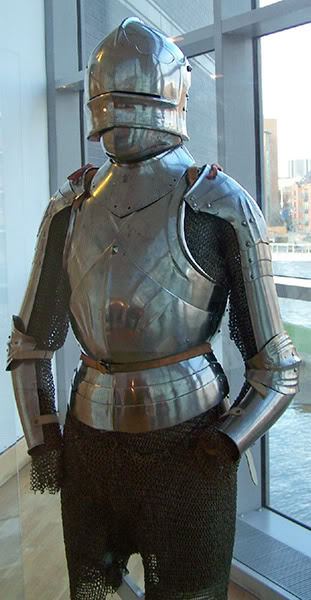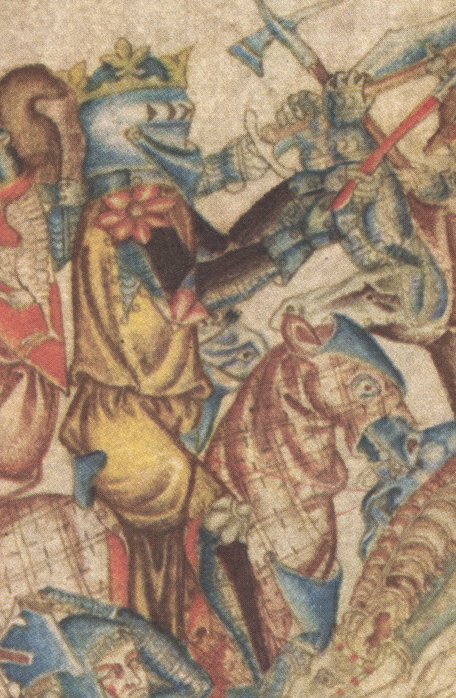| Author |
Message |
|
Colt Reeves
|
 Posted: Thu 26 Apr, 2012 10:02 pm Post subject: Odd Vambrace Armour Posted: Thu 26 Apr, 2012 10:02 pm Post subject: Odd Vambrace Armour |
 |
|
So I've been on a early 14th century kick recently and was looking through the Gothic Eye website. (http://www.gothiceye.com/index.asp)
I came across some pictures I had seen before and found interesting. Instead of simply going "Hmmmm..." and moving on as I did previously, I thought I'd ask if anyone here had further information they might share.
Check out these two images of de Bacon and Sir William FitzRalph:
http://www.gothiceye.com/popup.asp?Ref=KN025
http://www.gothiceye.com/popup.asp?Ref=KN027
More specifically, look at their forearms. It looks to me like the plates are on the inside or upper part of the forearm. This seems rather odd compared to most forms of forearm defense. Does anyone know more about this? Is it some sort of artistical license or perspective error, or is it an "accurate" representation of actual armour? If it is supposed to represent actual armour, what is the intended purpose? (It seems odd from a foot combat perspective, but it occurs to me that holding a crouched lance might very well put the upper part of the forearm at risk and this armour might thus be specifically for such fighting. Can any jousters comment on this?)
Also, does it look to anyone else like Sir William has armoured straps holding his gutter pieces on? The straps are depicted in the same shade and appearance as the gutter pieces themselves...
"Tears are for the craven, prayers are for the clown.
Halters for the silly neck that cannot keep a crown.
As my loss is grievous, so my hope is small.
For Iron, Cold Iron, must be master of men all..."
-Cold Iron, Rudyard Kipling
|
|
  |
 |
|
Aleksei Sosnovski
|
 Posted: Thu 26 Apr, 2012 10:53 pm Post subject: Posted: Thu 26 Apr, 2012 10:53 pm Post subject: |
 |
|
These are not on the upper but on the outer side, just like on this armor
 . .
Look where his hands are bent! Put you hands in the same position and you will see that what is the outer side of your forearms when you hold your hands in a natural position is now on top.
|
|
   |
 |
|
Jojo Zerach
|
 Posted: Fri 27 Apr, 2012 10:27 am Post subject: Posted: Fri 27 Apr, 2012 10:27 am Post subject: |
 |
|
I personally think these are indeed on the upper side of the forearm.
When half-vambraces were worn, they seem to have been on the upper side of the forearm, and not the lower side like you see in the SCA. (Which actually makes much more sense to me)
They were likely pointed separately from the other pieces.
Wasn't sure if you'd seen these, but here are some more examples of the same thing.
http://effigiesandbrasses.com/monuments/roger...170/large/
http://effigiesandbrasses.com/monuments/hugh_.../12/large/
These seem to have been worn alongside closed vambraces/rerebraces for a while before completely disappearing.
|
|
  |
 |
T.F. McCraken

Location: Ingleside, Illinois Joined: 13 Apr 2006
Posts: 128
|
 Posted: Fri 27 Apr, 2012 11:18 am Post subject: Posted: Fri 27 Apr, 2012 11:18 am Post subject: |
 |
|
I'm guessing "Artistic License" is the culprit. Looking at the whole picture I see quite anatomically wrong examples all over it.
I would also assume the artist wasn't an armourer.
My $.02
Murphy 
aka "Murphy"
See ya at Bristol Renaissance Faire!
The decisions we make, dictate the life we lead.
"I drank what?" -Socrates
www.celticfuryproduction.com
|
|
   |
 |
Mackenzie Cosens

Location: Vancouver Canada Joined: 08 Aug 2007
Posts: 238
|
 Posted: Fri 27 Apr, 2012 12:26 pm Post subject: Posted: Fri 27 Apr, 2012 12:26 pm Post subject: |
 |
|
Sir Hugh Hastings shows a lot more anatomical shaping http://effigiesandbrasses.com/monuments/hugh_.../12/large/. This support that this is real feature of some armour at this time.
As an aside: Over hand blows, fendenti and such, tend to be harder then a blow that come from below, Sottani
and such, so it makes sense to armour the top of the forearm with plate.
mackenzie
|
|
  |
 |
|
Jojo Zerach
|
 Posted: Fri 27 Apr, 2012 1:02 pm Post subject: Posted: Fri 27 Apr, 2012 1:02 pm Post subject: |
 |
|
| Mackenzie Cosens wrote: | Sir Hugh Hastings shows a lot more anatomical shaping http://effigiesandbrasses.com/monuments/hugh_.../12/large/. This support that this is real feature of some armour at this time.
As an aside: Over hand blows, fendenti and such, tend to be harder then a blow that come from below, Sottani
and such, so it makes sense to armour the top of the forearm with plate.
mackenzie |
His vambraces themselves also look to have a tulip shape.
I've never understood why when people try to reproduce these, they always wear them in line with the couter.
|
|
  |
 |
Mackenzie Cosens

Location: Vancouver Canada Joined: 08 Aug 2007
Posts: 238
|
 Posted: Fri 27 Apr, 2012 3:09 pm Post subject: Posted: Fri 27 Apr, 2012 3:09 pm Post subject: |
 |
|
In the famous image from the Holkham Bible the king appears to be wearing similar half-vambraces.
| Jojo Zerach wrote: | ...
When half-vambraces were worn, they seem to have been on the upper side of the forearm, and not the lower side like you see in the SCA. (Which actually makes much more sense to me)
... |
When I use to play SCA I occasional get hit in the bottom forearm when I attacked, in part because the sword technique I was using had the forearm lead the sword. This made the bottom of the forearm a target for a stop-hit so it makes sense to armour bottom for the forearm. With the more historic sword play I now do, the sword leads the blow not the arm, so the bottom of the forearm is a less available target.
mackenzie
 Attachment: 95.58 KB Attachment: 95.58 KB

Holkham Bible King
|
|
  |
 |
Robert S. Haile

|
 Posted: Sat 28 Apr, 2012 4:04 pm Post subject: Posted: Sat 28 Apr, 2012 4:04 pm Post subject: |
 |
|
|
Try putting your hands into the position seen on the effigy. You'll find your outer forearms face upward, and the artist is portraying the half that remain towards the viewer. This issue occurs with the twisting motion your arm does when assuming this position. I can see how the positioning could fool your eyes though.
|
|
   |
 |
|
|

